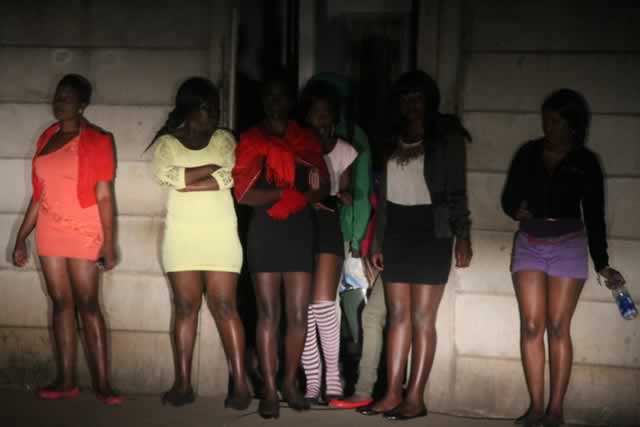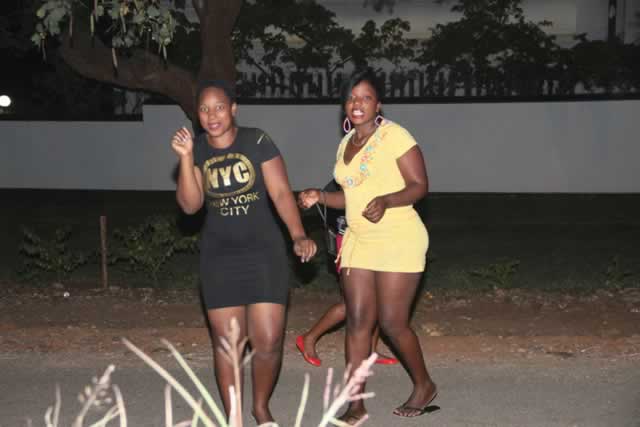Prostitutes savour Concourt ruling

-
. . . slash rates for customers
-
Women activists hail judgment
-
Residents, churches cry foul

Commercial sex workers parade themselves openly in the Avenues area in the aftermath of a Constitutional Court ruling which outlawed their arrest by the police
“The judgment is very welcome because it protects the rights of women and comes as an example of constitutionalism. It has vindicated the constitution especially the freedom of movement which proves that our Constitution is just.”
It is Thursday May 28 and ladies of the night have begun working the streets of Harare’s Avenues area. The time is 6:30pm and most are wearing a motley of outfits, from lacy bras, tight-fitting and revealing skirts to low rider jeans.
The wintry breeze is no deterrent.
In dark and well-lit corners, cars ranging from SUVs to sedans and Mercedes Benz stop to either pick or drop women.
There is no more constant looking over the shoulder.
Negotiations now take longer.
Recently, the Constitutional Court outlawed the arbitrary arrest of prostitutes and just days after the ruling, a mini Sodom and Gomorrah is emerging in the Avenues area.

Commercial sex workers parade themselves openly in the Avenues area in the aftermath of a Constitutional Court ruling which outlawed their arrest by the police
It’s now a hive of activity as ladies of the night of all shapes and sizes, the young and middle aged, reveal themselves to every passing car.
The Herald joined them last Thursday night to see how the city’s once underground “red light district” has sprung into life.
The time is now 7pm and darkness has enveloped the sun.
Our vehicle grinds to a screeching halt at corner Baines Avenue and Blackiston Street when we spot a group of scantily-dressed women chatting.
We immediately have company.
One of the women has outrun her peers to our car.
She gives us no chance and bursts: “We have just slashed our charges! It’s now $5 for a short time and $30 for the whole night, I stay close by.”
She neither waits for a response from her prospective customer, nor has she noticed that there is a female in the car.
Our Photographer Innocent Makawa invites her into the car and she complies.
She spots this writer and becomes rigid.

ENJOYING A NEW LEASE OF LIFE . . . Scantilly dressed commercial sex workers await clients in a dimly-lit street in the Avenues of Harare
We sweet-talk her into granting us an interview, a request she gladly accepts the moment we offer her an incentive.
Her name is Chipo Shoko (25) and she admits to have been in the world’s oldest profession since she was 17.
It’s joy night today, she says.
Her face suddenly lights up. She has been following developments at court and is happy.
“We have agreed to lower prices following the Constitutional Court ruling stopping police from arresting women suspected of soliciting for paid sex.
“Before the ConCourt ruling, we used to charge high fees because we would consider the risk of being arrested.
“We would use part of the money to bribe the police and pay fines. We welcome the move as it recognises our profession. We are also trying to make ends meet in these harsh economic times,” she says.
Chipo argued that since vendors had been allowed to sell their wares everywhere, they too had always cried out and wondered when they would get that freedom.
“With the ConCourt ruling, the playing field has been levelled.”
We meet another commercial sex worker operating along Fife Avenue.
She declines to be identified, but says she intends to start operating near the central business district where traffic volumes are high and the prospects of getting a good catch are higher.
“Why not? There is nothing to fear now. Our operations are somewhat legalised now. I am planning to move closer to the city centre where there are more clients,” she says.
On this day, her customers are lucky.
Charges are as low as R1.
“I want to show our appreciation because this is what we have always wanted as sex workers.”
Another sex worker only identified as Yvonne operates along Blackiston Street.
She is worried that her landlord would soon hike rentals.
Before the ConCourt ruling, they would pay between $15 and $20 per day at the flat she and other ladies of the night were renting.
“I am very happy that now I do not have to play cat-and-mouse with the police. We can now negotiate with our clients without imposing a risk fee in the event that we get arrested.
“My only fear is that our landlords will be tempted to adjust monthly rentals. We have been negotiating rentals and at times delay paying rentals using police fines as the excuse.”
Newcomers were also invading into the Avenues in droves.
Melody Chada, who used to operate from the ghetto, has made inroads into town where there are better-paying clients.
“I have been operating from Makoni Shopping Centre in Chitungwiza. But, after news that police were no longer allowed to arrest us, I have taken my trade into the CBD where there are more clients,” she says.
Chada said prostitution was now big business.
“It’s now game on. We are now free to roam every street. We are happy. This is my trade. The law has cleared us,” she said.
Semi-naked women could also be seen along Josiah Chinamano Avenue, Third Street, Fourth Street, and 7th Street and Samora Machel and Central avenues.
Most of them were charging between $5 and $10. Places like Queensdale Shopping Centre where sex workers usually loiter were unusually deserted.
In the CBD, aggressive sex workers have taken over some bars. However, not everyone is happy with the ConCourt ruling.
Residents feel such a lifestyle is unacceptable.
“What about residents who live in this area? What will our small children do if they see naked women,” said Mrs Lydia Zulu who stays near Third Street and Josiah Chinamano Avenue.
Mr Jonathan Mabwe said since the ConCourt judgment, he no longer drives along some streets in the Avenues.
“I have encountered these women while driving my mother-in-law and my wife. They were showing off their nakedness. It was embarrassing. Now that they are free with no one controlling them it would be worse than before,” he said.
Other residents said measures should be put in place to control the loitering of sex workers.
“Yes they are no longer being arrested but measures should be put in place to control them. If possible, they should be restricted from entering the CBD because soon we are going to see them there in broad daylight,” said Vongai Machirori of Queensdale.
Women activists hailed the recent judgment by the ConCourt.
President of the Apostolic Churches Council of Zimbabwe, Bishop Johannes Ndanga, said the law should be amended.
“As the church we want the law to empower police to arrest those suspected of prostitution without violating the rights of women.
“This will also help in reducing the spread of HIV and AIDS and other sexually transmitted diseases,” he said.
United Family International Church spokesperson Pastor Prime Kufakunesu said the church condemned prostitution.
“Prostitution is ungodly and the church strongly condemns it. It is very immoral to have those women use their bodies in that way because their bodies are God’s temples,” he said.
Women Action Group national director Edinah Masiyiwa described the ruling as an a legal milestone.
“We thank the Constitutional Court for protecting the rights of women, something we always fought for at the inception of this organisation,” she said.
Women in Law in Southern Africa Research and Education Trust national coordinator Ms Sylvia Chirawu welcomed the judgment saying it was a true example of constitutionalism.
“The judgment is very welcome because it protects the rights of women and comes as an example of constitutionalism. It has vindicated the constitution especially the freedom of movement which proves that our constitution is just,” she said.
Some legal experts were quoted as saying that prostitution was not an offence but a lifestyle hence the recent constitutional court ruling simply set parameters to guide police when effecting arrests on suspected solicitors of paid sex.
Harare Lawyer Mr Vote Muza said the availability of the latest ruling should never be seen as legalising prostitution.
The laws on prostitution vary considerably around the world. They can vary from total prohibition or both the sale and purchase of sexual services, bans on either, regulation to varying extent of some or all aspects, to minimal regulation or restriction of any activity.
Most countries in Africa have however, not legalised prostitution.








Comments